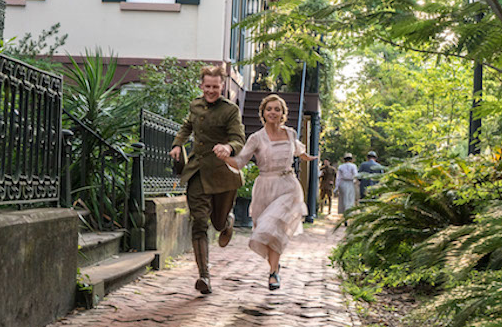“Nobody has ever measured, not even poets, how much the heart can hold.” For Zelda Sayre, the heart, apparently, could hold infinite amounts of tolerance for a fuckhead like F. Scott Fitzgerald. And Christina Ricci does quite a good job over the course of the ten-episode first season of Z: The Beginning of Everything to get this point across. In the pilot episode, which aired on Amazon, so long ago now, back in November of 2015, audiences were given a somewhat rocky introduction–acting wise–to the first person to bring Zelda to life since Alison Pill in 2011’s Midnight in Paris. This could be, in part, why it took until January 27th of this year for the rest of the episodes to materialize. By episode three, however, Ricci hits her stride.
One thing that is particularly accurate and memorable about the pilot, however, is Zelda’s insistence that, “Everything was about me.” This, naturally, pertains to F. Scott’s use of his wife–a combination ragdoll/muse. From the very moment he lays eyes on her (in the first episode, the creators, Dawn Prestwich and Nicole Yorkin, pull a Darrin Stephens in Bewitched on us with Gavin Stenhouse in the F. Scott role, followed by David Hoflin in the subsequent episodes), F. Scott knows he must have her. And it’s true, Zelda was a very unique spirit, even when taken out of the context of the Montgomery, Alabama milieu from which she was plucked. Though F. Scott insisted on immediate marriage before shipping off to World War I, Zelda wouldn’t have it, telling her beau he had to publish a successful first novel first before she would agree. Already a personal risk to her rapport with her parents, Judge Anthony Sayre (David Strathairn) and Minnie Sayre (Kristine Nielsen), she needed F. Scott to have some viable income apart from the mere declaration that he would be a great writer any day now.
The detail with which each episode delves into not just Zelda’s psyche, but the psyche she developed as a result of becoming so entwined with F. Scott, spares no minutiae–including a moment where Zelda falls to pieces over hitting a deer while driving back to Montgomery from Westport. Tracking her confidence from the outset of the series, Ricci exhibits a deft ability at going from the type of girl to strip down naked in front of a hotel room of people in order to get F. Scott all to herself to the type of girl who would give up her chance at becoming a Hollywood star just to appease her husband’s wounded ego.
Their codependent nature was finely cultivated by F. Scott himself, insisting that she needn’t do anything but be a lady of leisure, even stripping her of her only tasks while he began the initial writing phase of The Beautiful and the Damned at their rented beach home in Westport, Connecticut. An overt condemnation of her abilities as a housewife, he hired a Japanese man to carry out the tasks of making dinner and cleaning, leaving Zelda ample time to swim and write in her diary. In point of fact, she does a lot more writing than F. Scott, terrified of setting pen to paper for fear of not being able to create something as well-received as This Side of Paradise, lines of which he stole directly from Zelda’s letters to him during their time apart before getting married.
Ricci, with her doe-eyed innocence paired with a knack for being saucy, brings Zelda to life at key moments in her squabbles with F. Scott, which always tend to pertain to his drinking and stifling of her creative leanings. When F. Scott’s publisher makes the suggestion that Zelda publish her diaries under the title Diary of a Popular Girl, F. Scott instantly kiboshes the notion, saying it’s of more value to them to allow him to cull from it for his own writing. Cull, indeed, continuing to rip off direct lines for the duration of his career.
Nonetheless, Z: The Beginning of Everything manages to construct the story of Zelda and F. Scott in a manner that shows them as they truly were at their core: hopelessly and recklessly in love–even if it was a love often punctuated by hate and Bonnie and Clyde antics (i.e., the bathtub scene at the Biltmore Hotel and when Zelda drives through a toll without paying because they’re too broke to pay). At last being given the attention and care she deserves, Zelda is no longer painted as a frivolous party girl who was just plain crazy. For behind every crazy woman is a man who drove her to be that way.






















